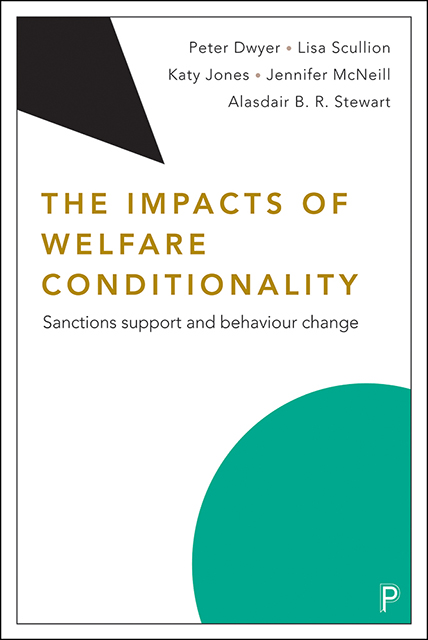Book contents
- Frontmatter
- Contents
- List of figures and tables
- List of abbreviations
- About the authors
- Acknowledgements
- One Introduction
- Two Conditionality in the UK welfare state
- Three Welfare conditionality and behaviour change
- Four From welfare to work? The effectiveness of welfare conditionality in moving people into paid employment
- Five Welfare conditionality and problematic or antisocial behaviour
- Six Unintended outcomes? The wider impacts of compulsion and benefit sanctions in social security
- Seven Ethical debates
- Eight Conclusions
- Methods appendix
- References
- Index
One - Introduction
Published online by Cambridge University Press: 17 June 2023
- Frontmatter
- Contents
- List of figures and tables
- List of abbreviations
- About the authors
- Acknowledgements
- One Introduction
- Two Conditionality in the UK welfare state
- Three Welfare conditionality and behaviour change
- Four From welfare to work? The effectiveness of welfare conditionality in moving people into paid employment
- Five Welfare conditionality and problematic or antisocial behaviour
- Six Unintended outcomes? The wider impacts of compulsion and benefit sanctions in social security
- Seven Ethical debates
- Eight Conclusions
- Methods appendix
- References
- Index
Summary
Welfare conditionality links eligibility to publicly funded welfare benefits and services to recipients’ specified compulsory responsibilities or particular patterns of required behaviour. It has been a key component of welfare state reforms in many nations since the mid-1990s (Watts and Fitzpatrick, 2018a). Conditional welfare arrangements, which combine compulsory engagement with various interventions to move social welfare benefit recipients into work (for example, mandatory work activity, job search and training activities) and/ or promote the cessation of problematic behaviour (for example, antisocial behaviour (ASB), substance abuse) with different types of sanction for non-compliance, are now an established part of policy within many social security, housing, homelessness, ASB and criminal justice and migration systems.
The UK has been at the forefront of this behavioural turn in policy. Over the last two decades welfare conditionality within the social security system has been extended to incorporate previously exempt groups including many disabled people, lone parents of young children, and since 2013 with the introduction of Universal Credit (UC), low-paid workers and their partners who are in receipt of in-work housing and low-wage supplements and various working tax credits (Dwyer, 2016). Simultaneously, the length and severity of benefit sanctions that can be applied has been intensified (DWP, 2012a; Adcock and Kennedy, 2015) with unprecedented numbers of people made subject to their application. In the period of the ‘great sanctions drive’ (Webster, 2016) between 2010 and 2015, approximately 25 per cent of Jobseeker’s Allowance claimants experienced a benefit sanction (Butler, 2017) with numbers peaking in 2013 when 1,037,000 were imposed (Adler, 2016).
Advocates of welfare conditionality routinely assert that various combinations of sanction and support are both a fair and an effective way to move people off welfare benefits and into paid work and/ or make people desist from antisocial or problematic behaviour (see, for example, Mead, 1982; Blair, 2006; Duncan Smith, 2014; Dunn, 2014). Conversely, those who oppose the use of welfare conditionality believe that it is unfair, intentionally punitive, ineffective in promoting paid employment and personal responsibility and likely to exacerbate the poverty and social exclusion of already disadvantaged populations (see, for example, Dwyer, 1998, 2018b; Etherington and Daguerre, 2015; Fletcher and Wright, 2018; Patrick, 2017; Adler, 2018).
- Type
- Chapter
- Information
- The Impacts of Welfare ConditionalitySanctions Support and Behaviour Change, pp. 1 - 19Publisher: Bristol University PressPrint publication year: 2022



